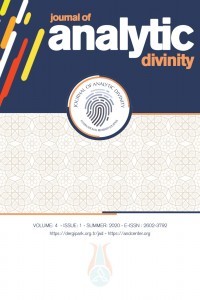Gazzâlî’nin Cevâhirü’l-Ḳurʾân Adlı Eseri
William Motgomery Watt; Müslümanlar ve batılılar tarafından Hz. Muhammed’ten sonra en büyük Müslüman olarak İmam Ebû Hamîd Gazzâlî’nin görüldüğünü söyler. Buna rağmen onun bazı eserleri hak ettikleri öneme sahip olamadılar ve bunlardan birisi Cevâhirü’l-Ḳurʾân ve Düreruhu (Kur’an’ın Cevher ve İncileri) adlı kitaptır. O, bu eserinde Kur’an-ı Kerîm’e kalp penceresinden bakar. Dolayısıyla eser tefsir olduğu kadar tasavvuftur da. Gazzâlî, bu eserinde sıkça rumuz yöntemini kullanır. Buna göre Kur’an, Allah’ı anan kalbe daha farklı bir biçimde hitap etmektedir. Tüm bilgiler Allah ve sıfatları için vardır. Buna karşın Allah’ın zatı ve sıfatları hakkındaki bilgiler ise sadece kendileri için vardırlar, yoksa diğer bilgiler için değil. Dolayısıyla tanrısal bilgi olan mârifetullah en yüce cennettir, hatta bu cennet ahiret cennetinden bile üstündür. Kur’an ayetlerinin hepsi aynı öneme sahip değildir. Allah’ın zatı ve sıfatları ile direkt ilgili olan ayet ve sureler dolayısıyla birçok ayet ve sureden daha faziletli olmaktadır zira tüm bilgiler Allah’ın zatı ve sıfatları için vardır. Cevherden kasıt bilgiler iken incilerden kasıt ise eylemlerdir. Bilgi ve eylem ise ayrıştırılamaz.
Anahtar Kelimeler:
Kuran, Gazzali, Cevahirü'l-Kur'an, Kalp, Eylem
The Book of Al-Ghazali: Cevahirü'l-Quran
William Montgomery Watt says that Imam Abu Hamid al-Ghazali is regarded as the greatest Muslim after Muhammad, for both Muslims and westerns. Despite this, some of his works did not get the importance they deserve and one of them is the book called Cevâhirü’l-Qurʾân ve Düreruhu (The Substances and Pearls of The Quran). In this work, he evaluates the Quran in terms of heart. Therefore, the work is not only Quran commentary but also Sufism. Ghazali frequently uses the symbolism method in this work. Accordingly, the Quran reveals itself differently to a person who contemplates Allah. All knowledge is for Allah’s Essence (dhāt) and His attributes. On the other hand, the knowledge about God’s Essence and His attributes is only for them, not for other knowledge. Therefore, the divine knowledge, mârifetullah, is the highest heaven, even this paradise is superior to the paradise of the hereafter. Not all verses of the Quran are of the same importance. The verses and suras directly related to God’s Essence and His attributes are therefore more virtuous than many verses and chapters, because all knowledge exists for God’s Essence and His attributes. Knowledge is meant by substance and action is meant by pearl. Knowledge and action cannot be separated.
Keywords:
Qur'an, Cevahirü'l-Qur'an, Heart, Action, Al-Ghazali,
___
- Gazzâlî, Ebû Hâmid Muhammed b. Muhammed b. Muhammed b. Ahmed et-Tûsî. Cevâhirü’l-Ḳurʾân ve Düreruhu, thk. Muhammed Necdet el Muhammed. Şam: Dârul Hadi, 2006.
- Gazzâlî, Ebû Hâmid Muhammed b. Muhammed b. Muhammed b. Ahmed et-Tûsî. Filozofların Tutarsızlığı. Çev. Mahmut Kaya-Hüseyin Sarıoğlu. İstanbul: Klasik Yayınları, 2016.
- Gazzâlî, Ebû Hâmid Muhammed b. Muhammed b. Muhammed b. Ahmed et-Tûsî. el-Müstaṣfâ min ilmi’l-uṣûl. Thk. Muhammed Abdurrahman el-Maraşlî. Beyrut: Dâru’n-Nefâ’is, 2011.
- Gazzâlî, Ebû Hâmid Muhammed b. Muhammed b. Muhammed b. Ahmed et-Tûsî. Kimyâ-yı Saʿâdet. İstanbul: Bedir Yayınevi, t.s.
- Gazzâlî, Ebû Hâmid Muhammed b. Muhammed b. Muhammed b. Ahmed et-Tûsî. Kimyâ-yı Saʿâdet. Çev. Ali Arslan. İstanbul: Merve Yayınları, t.s.
- Fazlur Rahman. İslam. Chigago-London: University of Chigago Press, 2002.
- Foucault, Michel. Doğruyu Söylemek. Çev. Kerem Eksen. İstanbul: Ayrıntı Yayınları, 2016.
- Gabriel G.-Rentsch Th. “Platonismus”. Historisches Wörterbuch der Philosophie, Herausgegeben von Joachim Ritter und Karlfried Gründer, Sonderdruck aus Band 7 (P-Q), Basel: Schwabe-Co. AG Verlag, 1989.
- Görmez, Mehmet. Gazâlî’de Sünnet, Hadis ve Yorum. Ankara: Otto Yayınları, 2014.
- Hourani, George F. “A Revised Chronology of Ghazali’s Writings”. Journal of American Oriental Society 104/2 (1984), 289-302.
- Işık, Ceyhan. “Gazzâlî’ye Göre Her Teorinin Pratik Olması”. Iğdır Üniversitesi Sosyal Bilimler Dergisi 24 (Ekim 2020), 1-13.
- İbn Sînâ, Ebû Alî el-Hüseyn b. Abdillâh b. Alî. “İs̱bâtü’n-nübüvvât ve teʾvîlü rumûzihim ve ems̱âlihim”. Tisʿu resâʾil içinde. Kahire: y.y., 1326.
- Yayın Aralığı: Yılda 2 Sayı
- Başlangıç: 2017
- Yayıncı: Özcan GÜNGÖR
Sayıdaki Diğer Makaleler
Müslümanların Seyahat Motivasyonları: Pozitif Psikoloji Perspektifinden Bir Değerlendirme
Yavuz Sultan Selim Dönemi Hilafet Telakkisi
Gazzâlî’nin Cevâhirü’l-Ḳurʾân Adlı Eseri
Dine Karşı Din: Ali Şeriati'nin İki Kutuplu Din Anlayışı
Descartes’in Epistemolojisinde Tanrı Fikri
Dine Karşı Din: Ali Şeriati'nin İki Kutuplu Din Anlayışı
Çoğulcu Toplum Okullarında Din Eğitiminin Birlikte Yaşama Kültürüne Etkisi
Etik Yönetim Perspektifinden Kutadgu Bilig Değerlendirmesi
Lise Döneminde Şiddet Algısı ve Nedenleri Üzerine Bir Saha Çalışması: Elazığ Örneği
Anadolu Millî Mücadele Hareketine Tekke ve Tarikat Şeyhlerinin Katkıları
